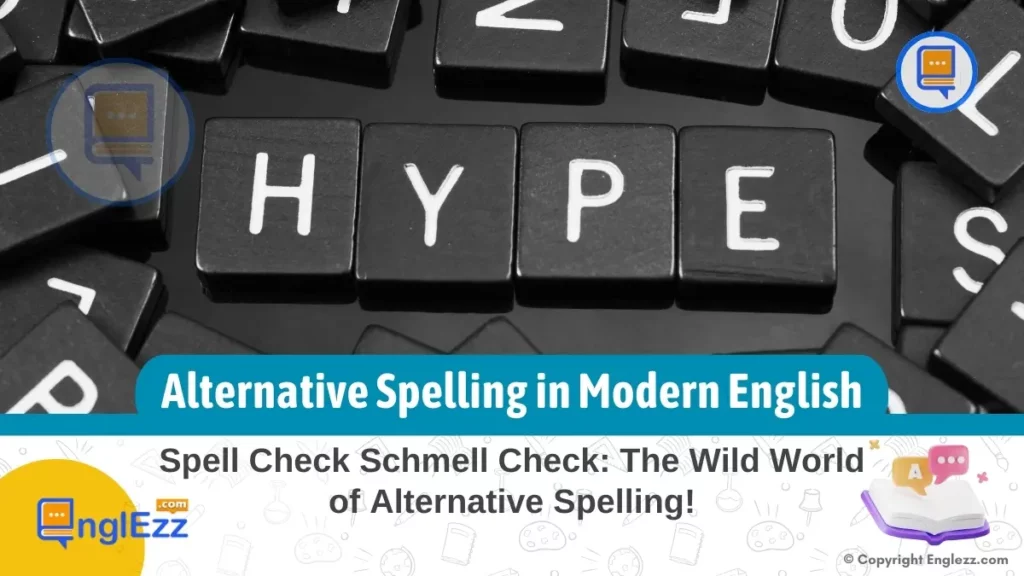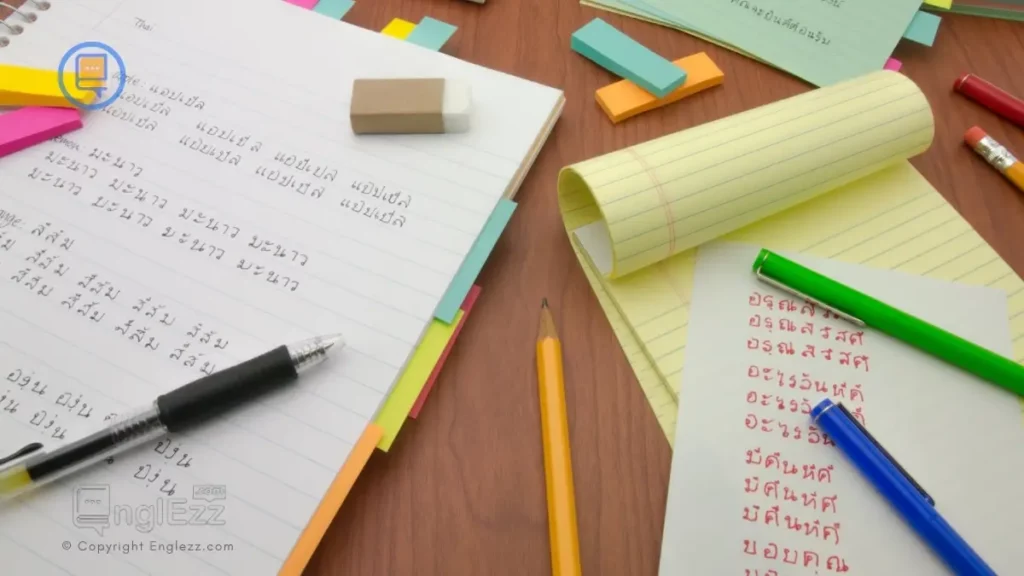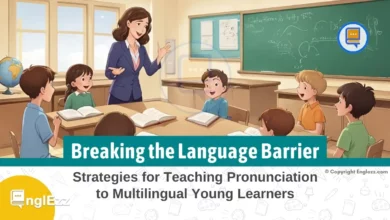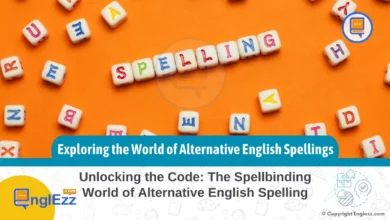The fabric of English language usage is intricately woven with a tapestry of evolving conventions, where the interchange between tradition and innovation forms a mosaic of linguistic expression. In this ever-shifting landscape, alternative spellings emerge as the brushstrokes of creativity that challenge established norms, prompting a reimagining of written communication. From the realms of social media to the corridors of pop culture, unconventional orthographic choices hold sway over modern English usage, shaping the very essence of how we interact with words.
The Art of Alternative Spelling in Modern English
Amidst this dynamic linguistic milieu, the influence of social media, memes, and pop culture looms large as driving forces behind the proliferation of alternative spelling trends. The digital realm acts as a crucible for experimentation, birthing novel ways to defy traditional orthography and infuse language with fresh vitality.

Within this virtual agora, users engage in a dance of linguistic ingenuity, fostering a fertile ground where kreative reinterpretations take root alongside conventional constructions. As hashtags spark movements and viral content ignites global conversations, each click and share propels alternative spellings from the fringes to the forefront of contemporary lexicon.
Evolution of Spelling Norms
The evolution of English spelling norms traces back to a time when spelling was far more fluid and varied than the standardized system we are familiar with today. Early English spelling exhibited considerable flexibility, with words often spelled differently even within the same text due to regional variations and individual scribes’ preferences. As language began to be more formally documented through texts like the King James Bible in the 17th century, attempts were made to establish consistent spellings for words, leading to the gradual standardization of spelling rules. However, this standardization process did not eradicate variation entirely but rather established dominant norms that have persisted over time.
Innovative spellings in English have frequently emerged as a result of cultural influences shaping language usage. For instance, borrowing from other languages or accommodating foreign terms has given rise to new orthographic patterns in English. The adoption of words like “rendezvous” from French or “schadenfreude” from German has introduced unique phonetic structures that required adjustments in spelling conventions. Additionally, technological advancements and globalization have brought about changes in vocabulary and pronunciation, prompting adaptations in spelling to reflect these shifts accurately.
The acceptance or rejection of alternative spellings in mainstream English is influenced by a complex interplay of factors such as social attitudes, educational practices, and media exposure. While some innovative spellings gain traction through widespread usage and popular culture references—like the word “womxn,” which aims to be inclusive—others face resistance due to perceived deviations from established norms. The debate between prescriptivist views advocating for strict adherence to traditional spelling rules and descriptivist perspectives acknowledging evolving linguistic practices continues to shape contemporary discussions on alternative spellings within the broader context of language standardization and creativity.
Social Media as a Catalyst for Change
In the realm of modern English usage, social media platforms play a crucial role in shaping alternative spelling trends. The instantaneous and widespread nature of platforms like Twitter and Instagram facilitates rapid dissemination of language innovations. User-generated content on these platforms often showcases unconventional spellings that reflect individual creativity and linguistic playfulness. For instance, the brevity demanded by Twitter’s character limit has sparked abbreviations, acronyms, and unique spellings to convey complex ideas in limited space. This phenomenon not only highlights the adaptability of language but also underscores the influence of digital communication on spelling conventions.
Furthermore, hashtags have emerged as potent tools for popularizing non-traditional spellings by creating online communities around specific phrases or concepts. Memorable hashtags like #ThrowbackThursday or #tbt have not only altered traditional word usage but have also encouraged users to creatively manipulate spellings for emphasis or humor. These linguistic innovations, fueled by viral content and internet memes, often transcend online spaces to permeate everyday conversations. Thus, social media acts as a dynamic platform where alternative spellings gain traction through user interaction and engagement.
The viral nature of social media content amplifies the impact of innovative spellings by swiftly integrating them into mainstream discourse. Emoticons, emojis, and abbreviations that originated in digital communication have now found their way into everyday language usage due to the pervasive influence of platforms like Instagram and Snapchat. The speed at which new words or spellings spread across social media channels challenges traditional notions of language standardization and evolves English into a more fluid and adaptive form. Hence, studying the role of social media as a catalyst for alternative spelling changes offers valuable insights into contemporary linguistic evolution and its intersection with digital culture.
Linguistic Creativity in Memes
Memes, as popular cultural artifacts shared widely on social media platforms, have become a breeding ground for linguistic innovation through alternative spellings. These humorous images or videos often feature text overlays with intentionally misspelled words or phrases that generate comedic effects. For instance, the “Distracted Boyfriend” meme circulated online with captions like “Me: I should finish my work / Also me: Starts watching Netflix,” playfully altering spelling conventions for emphasis and relatability. Memes provide a space for language users to experiment with creative orthographic forms as a means of engaging audiences and creating online communities.
Specific examples showcase how memes have influenced spelling variations within everyday language usage by integrating unconventional spelling choices into popular discourse. Memes such as the “Woman Yelling at a Cat” series have inspired captions like “Me explaining to my cat why he can’t go outside / My cat who clearly doesn’t care,” where deliberate misspellings enhance the humor and convey informal communication styles adopted in digital interactions. This phenomenon reflects a playful approach to written language that adapts traditional orthographic rules to suit contemporary modes of expression, demonstrating how memes serve as vehicles for linguistic creativity.
Moreover, humor and online culture play pivotal roles in shaping language evolution through playful misspellings found in memes. By subverting conventional spelling norms in jest, internet users engage in linguistic play that not only entertains but also highlights the fluidity of language in digital spaces. The viral nature of memes ensures that these altered spellings reach a vast audience rapidly, contributing to the normalization of creative orthographic practices within modern English usage. As such, memes represent a dynamic medium through which language is continually reinvented and repurposed, showcasing the symbiotic relationship between humor, technology, and linguistic innovation on digital platforms.

Pop culture has long been a fertile ground for influencing modern English spelling trends. References from movies, TV shows, and music often introduce unique spellings based on characters or catchy phrases that resonate with audiences. For example, the iconic phrase “May the Force be with you” from Star Wars popularized the informal usage of “May the Fourth Be with You” as a playful nod to the franchise on May 4th each year. This adaptation not only showcases how fan communities creatively alter standard phrases but also influences broader language usage as it spreads through social media and everyday conversations.
Television series like “Game of Thrones” have also left their mark on English spelling norms by incorporating terms like “khaleesi” (meaning queen in Dothraki). Such fantasy lexicon has seeped into popular culture, leading to its adoption in everyday communication. Music genres like hip-hop have introduced slang and alternative spellings that reflect urban dialects and subcultural identities, shaping linguistic diversity within English. These instances show how pop culture references not only reflect current language trends but actively contribute to the evolution of spelling conventions.
The entertainment industry plays a significant role in normalizing alternative spellings among language users. By presenting creative variations in mainstream media, such as intentionally misspelled brand names or titles for visual impact or branding purposes, these mediums influence public perception and acceptance of non-traditional spelling practices. The recurring use of altered spellings in advertisements, movie titles (e.g., “Kwik-E-Mart“), or band names can lead to increased tolerance for linguistic creativity in formal and informal contexts, blurring the lines between traditional correctness and innovative expressions within modern English.
Educational Implications and Challenges
Educators often grapple with the dilemma of accommodating students’ creative spelling choices while upholding linguistic standards in academic settings. While alternative spellings can be viewed as a form of self-expression and cultural adaptation, they may inadvertently sow confusion in formal written assignments. For instance, students incorporating trendy spellings from social media or pop culture references might struggle to communicate effectively within traditional academic contexts. This presents a challenge for educators seeking to nurture language skills that seamlessly transition between contemporary communication styles and conventional writing norms.
To address these challenges, language instructors are exploring innovative strategies to engage students with alternative spelling trends without sacrificing educational rigor. By contextualizing non-traditional spellings within discussions on language evolution and creativity, teachers can help learners appreciate different forms of expression while reinforcing the importance of adhering to standard conventions where necessary. For example, integrating lessons on the history of English orthography alongside analyses of modern spelling variations can foster a deeper understanding of the dynamic nature of language, encouraging critical thinking about linguistic diversity within educational frameworks.
Finding the delicate balance between embracing linguistic diversity and upholding language standards poses an ongoing pedagogical conundrum. Educators must navigate this complexity by fostering an environment where students feel empowered to explore creative expressions while also honing their proficiency in conforming to established orthographic norms when required. By promoting discussions on the impact of alternative spellings across different contexts and guiding students towards nuanced language use, educators play a vital role in shaping how emerging spelling trends interact with traditional language practices within educational spaces.
The Influence of Alternative Spelling
In exploring the influence of alternative spelling on modern English usage, it is crucial to delve into how linguistic scholars perceive these phenomena. Scholars often view alternative spellings as a reflection of language evolution and adaptation to new communication mediums. While traditionalists may resist non-standard spellings, many linguists embrace creative misspellings as a form of linguistic innovation. They see these deviations from standard norms not as errors but rather as manifestations of linguistic creativity in response to changing societal dynamics.
The scholarly discourse surrounding alternative spellings emphasizes the dual nature of language development: the preservation of established conventions and the integration of novel expressions. Language enthusiasts play a significant role in championing innovative spellings by actively participating in digital communication spaces where linguistic experimentation thrives. Platforms like Reddit and Tumblr serve as hubs for language enthusiasts to exchange ideas and advocate for the incorporation of unconventional spellings that resonate with contemporary cultural contexts.
Language scholars and enthusiasts alike appreciate the dynamic nature of language that allows for fluidity and experimentation while also acknowledging the need for standardization in formal contexts. The adaptation of new spellings reflects a dynamic interplay between preserving linguistic traditions and embracing innovative forms of expression, highlighting the ongoing negotiation between adhering to established norms and adapting to evolving language trends in modern English usage.
The Study of Alternative Spellings
The study of alternative spellings within the realm of linguistics often relies on various theoretical frameworks that provide insights into the creative processes involved in language evolution. Linguists utilize frameworks such as cognitive linguistics, sociolinguistics, and psycholinguistics to delve into the complex relationships between language creativity and orthographic innovations. Cognitive linguistics, for example, explores how mental processes shape language production and comprehension, offering explanations for why individuals may opt for unconventional spellings based on cognitive ease or mnemonic devices. By examining the cognitive mechanisms behind spelling variations, researchers gain a deeper understanding of how creativity manifests in linguistic practices.
Sociolinguistic perspectives play a pivotal role in studying alternative spellings by focusing on the social dynamics that influence language usage. Scholars investigate how cultural values, group identities, and societal trends impact spelling choices, shedding light on why certain alternative spellings gain traction within specific communities. For instance, studies have shown how online fandoms develop unique lexicons with altered spellings to denote insider knowledge or affinity towards a particular subculture. Through a sociolinguistic lens, researchers can uncover the social motivations driving alternative spelling patterns in contemporary English discourse.
Moreover, psycholinguistic theories offer valuable insights into the cognitive processes underpinning language production and reception concerning innovative spellings. By analyzing how individuals perceive, interpret, and produce unconventional spellings, psycholinguists contribute to our understanding of linguistic creativity and its implications for language development.
Research in this field can elucidate the psychological factors influencing both individual choices in spelling variations and broader trends seen across digital communication platforms. The integration of psycholinguistic principles into the study of alternative spellings enriches scholarly investigations by bridging cognitive explanations with real-world linguistic phenomena observed in modern English usage.
Future Trajectories: Forecasting Language Evolution
In envisioning the future of English language usage, it is evident that alternative spellings will continue to play a significant role in shaping orthographic norms. With the pervasive influence of digital communication platforms and the ongoing evolution of linguistic creativity, one can anticipate a further diversification in spelling practices. For instance, the rise of text messaging shorthand has already introduced abbreviations like “gr8” for “great” into informal written communication, indicating a trend towards increased phonetic spelling adaptations. This phonetic shift may lead to more relaxed attitudes towards traditional spelling conventions in everyday interactions.
Moreover, as social media environments become increasingly integral to global discourse, linguistic borders are becoming more porous, facilitating the cross-pollination of spelling variations across cultures. For example, internet slang terms like “LOL” (laugh out loud) have transcended geographical boundaries and are now commonplace in vernacular language use worldwide. This trend suggests a future where alternative spellings may seamlessly integrate into standard English lexicons, blurring the distinction between formal and informal modes of expression.
Looking ahead, one can speculate that educational institutions will face challenges reconciling conventional spelling standards with emerging linguistic trends. The need to adapt pedagogical approaches to accommodate creative spellings while maintaining clarity and uniformity will likely be a focal point for educators. Strategies that strike a balance between nurturing language diversity and upholding foundational language rules will be essential in preparing students for nuanced communicative landscapes shaped by innovative spelling practices. Thus, forecasting the trajectory of English language evolution entails navigating the complex interplay between tradition and innovation in textual representations.

In essence, as English continues its journey of linguistic transformation influenced by alternative spellings, embracing this fluidity within orthographic structures can lead to enhanced communication efficacy across diverse contexts. By recognizing and anticipating the evolving landscape of language use propelled by creative spellings, individuals can actively participate in shaping future orthographic norms that reflect contemporary modes of expression while honoring established linguistic traditions.
Predicting these future trajectories involves acknowledging the dynamic interplay between conventional standards and innovative forms of spelling as integral components of language evolution in a digital age.
Navigating the Intersection of Innovation and Tradition in Modern English Spelling Norms
In conclusion, the exploration of alternative spellings in modern English unveils a complex interplay between innovation and tradition. The influence of social media, memes, pop culture references, and linguistic creativity has sparked a shift towards unconventional spelling practices. While these alternative spellings serve as expressions of individuality and creativity in linguistic communication, they also challenge established orthographic norms. This dynamic tension between embracing new forms of expression and upholding traditional standards underscores the evolving nature of language usage.
As we navigate this intersection of innovation and tradition within the realm of alternative spelling, fundamental questions emerge regarding the future trajectory of English language norms. How do educators reconcile teaching standard conventions with acknowledging the creative diversity inherent in contemporary spelling trends? What theoretical frameworks best capture the phenomenon of alternative spellings as vehicles for language evolution?
These inquiries propel scholarly discourse forward, highlighting the necessity for ongoing research to elucidate the nuanced dynamics shaping modern English usage through inventive forms of expression. Ultimately, the coexistence of innovation and tradition in spelling practices mirrors broader cultural shifts, inviting continued investigation into the intricate relationship between language evolution and creative adaptation.








